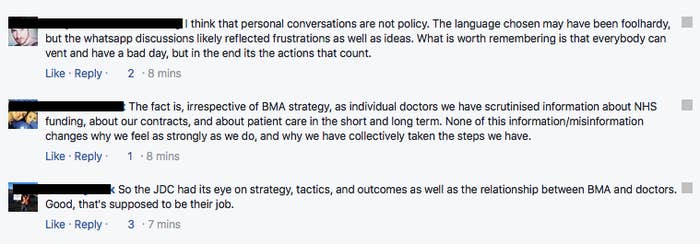
Leaked internal messages from the British Medical Association's (BMA) junior doctors committee have revealed the “red line” for negotiations over a controversial new contract was staff weekend pay – despite public declarations otherwise.
In the massive cache of messages obtained by Health Service Journal, junior doctors chair Johann Malawana also suggested late last year that the "best solution" could be to "draw out" doctors strikes, forcing the government into imposing the contract.
The leak comes just over a week after the BMA and the Department of Health wrapped up protracted negotiations over the contract.
The recent talks were hailed as the beginning of a resolution for an increasingly acrimonious battle between doctors and health secretary Jeremy Hunt. A tentative agreement saw the BMA partially relent on weekend hours, in concession to increased wages and promises of improved safeguarding. Hunt labelled the agreement a "win-win," and Malawana called it "a fair and safe contract".
The thousands of internal WhatsApp messages between executive members of the BMA's junior doctors committee leaked today also revealed:
– In January, when the first set of talks broke down, Malawana said the BMA should take part "to play the political game of always looking reasonable” and described the talks as "rubbish".
– Malawana warned against full walkouts. Describing them as "juniors' vanity events", he said they would "blow up in our faces".
– There were fractures between the junior doctors committee and the BMA's leadership, including council chair Mark Porter.
The WhatsApp group, created by Malawana to informally discuss proposed changes to the contract, addressed the issue of weekend pay last year.
In a message to the group, Malawana asked whether junior doctors would be prepared to accept a deal that would make Saturday effectively another weekday.
"It's the only red line," former committee chair Kitty Molan said. Another member of the group, Arrash Arya Yassaee, said: "Bluntly, no."
In agreement, Malawana said the BMA should approach negotiations with a "high watermark", allowing them to continue negotiating other aspects of the contract but interspersed with protracted periods of industrial action.
The leaks contradict much of what the BMA said publicly.
In February Malawana said publicly that the government could avert strike action "by re-entering talks with the BMA and addressing rather than simply ignoring the outstanding issues and concerns of junior doctors".
The leaked messages also revealed Malawana criticised "everyone at the top" of the BMA during the dispute.
In comments he later apologised for, saying they were made in a moment of frustration, he said the BMA needed a "root and branch change to make it actually into an organisation that is much more focused on doctors".
“This whole process has absolutely convinced me the BMA is not lead [sic] in a proper way," he said at the time.
“I think the fault lies with everyone at the top of the organisation. We suffer from a lack of a clear leadership and a clear vision about a membership organisation should be about.”
Responding to the leak, a BMA spokesperson said on Thursday that the conversations revealed junior doctors' "anger and frustration" over the government's "refusal" to listen to their concerns.
"What’s important is what was done in order to reach a negotiated agreement and ensure that the long-term interests of patients and the NHS are protected,” they said in a statement to BuzzFeed News.
"Private discussions should not be mistaken for the agreed strategy of the BMA junior doctors committee, which was communicated publicly."
The BMA declined to comment on Malawana's comments regarding its leadership.
Online, many junior doctors today expressed support for the BMA.

Junior doctors – medics below the level of consultant – are postgraduates who are working while continuing their studies in order to become either consultants or GPs.
Junior doctor of two years Ben Jaraway, 27, said he didn't want to "make judgment" on the BMA's actions.
"Simply put, this seems a very complicated issue," he told BuzzFeed News. "Rest assured that junior doctors have always had patient health at heart and regardless of politic, I would like to think this is the BMA's motivation too. Unfortunately the NHS cannot be extracted from politic[s] and to ignore this would be foolish."
He added that the leaked conversations "should be taken with a pinch of salt".
BMA member Tom Oates, 36, a junior doctor for 12 years, said the messages suggested junior doctors had been misled over the issue of weekend pay by the BMA negotiating committee.
"This does clearly show that the Saturday pay was very much downplayed publicly, but was a big thing privately," he told BuzzFeed News. But he noted the nature of such dispute was "adversarial" and therefore the messages showed only an "evolving response to a situation".
Oates continued that the inexperience of the committee heading contract negotiations may have impacted on negotiations. "I and others had been calling for the BMA to get people who have more experience involved … and what these WhatsApp messages show is that might have been a good idea," he said.
